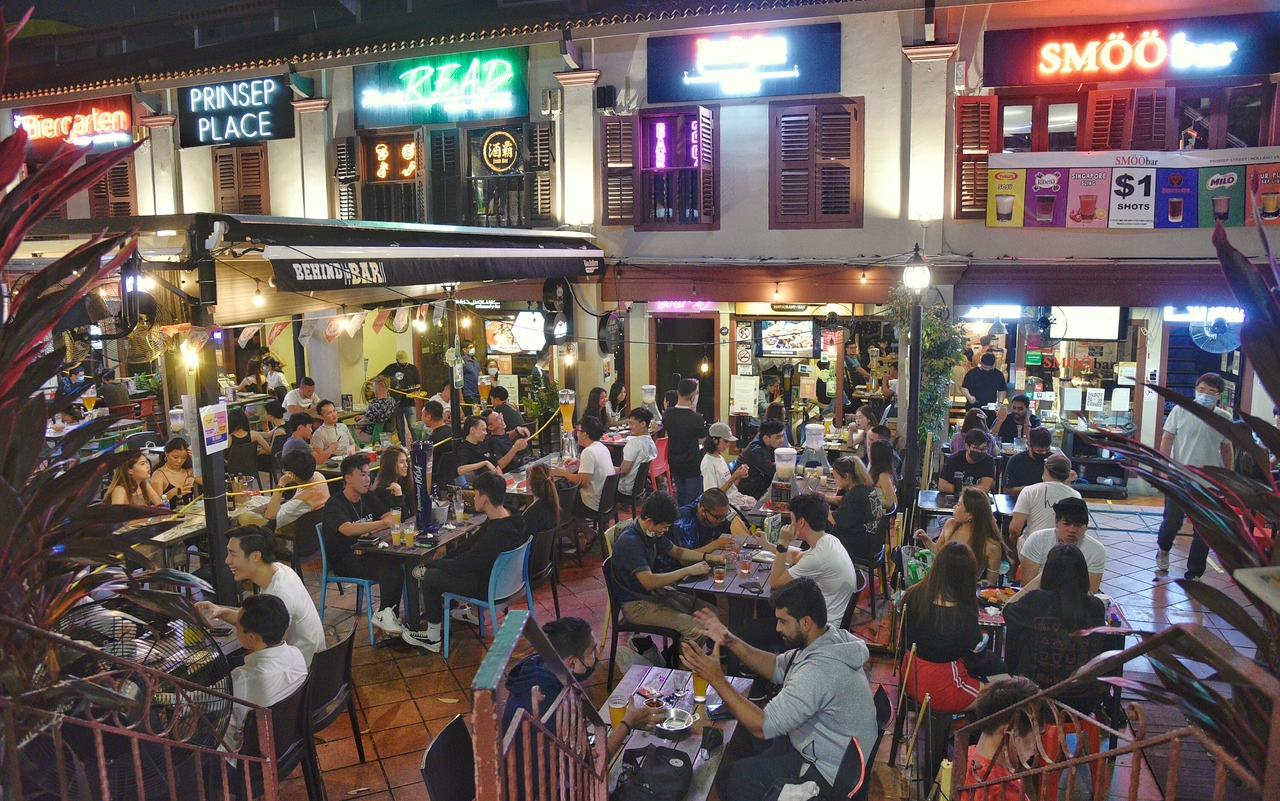F&B operators call for curbs on music, alcohol sales to be eased, citing financial struggles
Sign up now: Get ST's newsletters delivered to your inbox

The operators say allowing the sale of alcohol till midnight would allow business to earn revenue and repay debt.
ST PHOTO: DESMOND WEE
SINGAPORE - Food and beverage operators have called on the Government to allow the sale of alcohol till midnight, instead of the current 10.30pm limit, as well as recorded background music to be played to make dining in more attractive to customers.
While they welcomed having on-premises dining again, they also asked for early payouts from job support and rent relief schemes, saying that many businesses are on the brink of closure.
In a joint letter to the Government on Tuesday (Aug 10), the Singapore Nightlife Business Association, Singapore Cocktail Bar Association and #savefnbsg, an independent restaurant coalition of 500 establishments, laid out the toll of Covid-19 restrictions on the sector and appealed to the Government to accelerate reopening measures.
They said: "F&B businesses are struggling to resume normalcy following three rounds of closures in the last 18 months. Many have depleted their cash flow and are at risk of permanent closure. The most recent support measures are appreciated and have provided temporary financial relief. However, what the F&B industry needs is an expedited reopening, so we can start working towards financial independence and becoming viable businesses once again."
The groups requested that the multi-ministry task force on Covid-19 reconsider the restrictions on recorded background music in venues, which was allowed in phases two and three of reopening last year.
The sale of alcohol till midnight, they said, would allow businesses to earn revenue and repay debt accumulated as a result of the dine-in restrictions.
"The current restriction of 10.30pm forces late-night gatherings to move into homes, making it more difficult to regulate and adding disturbance to residential neighbourhoods. In contrast, F&B businesses provide regulated safe places for our people to gather and have healthy social interactions, through the implementation of safe management measures," they said.
According to a survey of 639 respondents from the F&B sector, 80 per cent said their revenue had dropped by 75 per cent or more in the last two rounds of restrictions between May and July. About 43 per cent had taken out loans of up to $1.5 million to keep working, and 8 per cent had taken loans between $1.5 million and $3 million.
Seventy per cent of the respondents said they had undertaken employee cost saving measures such as layoffs and salary cuts, while the same number had requested deferments on rent and debt repayment.
The operators also asked the Government to bring forward payouts from the Rental Support Scheme and Jobs Support Scheme, scheduled for October and December respectively, to support struggling establishments. They also asked for principal bridging loan repayments to be deferred to June next year.
In addition, they want a collaborative approach to safe management measures and a demerit point system to track non-compliance.
Experts The Straits Times spoke to said a step-by-step approach to reopening was vital to prevent a sudden surge of cases, particularly severe cases requiring hospitalisation.
Professor Dale Fisher, senior consultant at the National University Hospital's Division of Infectious Diseases, said previous surges had shown that restaurants, nightclubs and bars could be hot spots of infection.
He added that background music and alcohol consumption could be linked to other activities that risk a spread of infection.
"We want to reopen while gauging the impact of the easing restrictions and ensuring hospitals do not fill up. While the food and beverage sector is an important part of the economy, a step-by-step reopening is the conservative approach to striking a balance."
Infectious diseases specialist Leong Hoe Nam said the current vaccination rate was not high enough for a rapid easing of restrictions.
"With a slow reopening, we expect to see a rise in cases, but a surge of severe cases among those who are unvaccinated may result in a burden on the healthcare system," he added.
Citing the recent KTV clusters, Dr Leong said further reopening was possible if venues were limited to vaccinated individuals, and there was adequate policing and antigen rapid testing in place.


